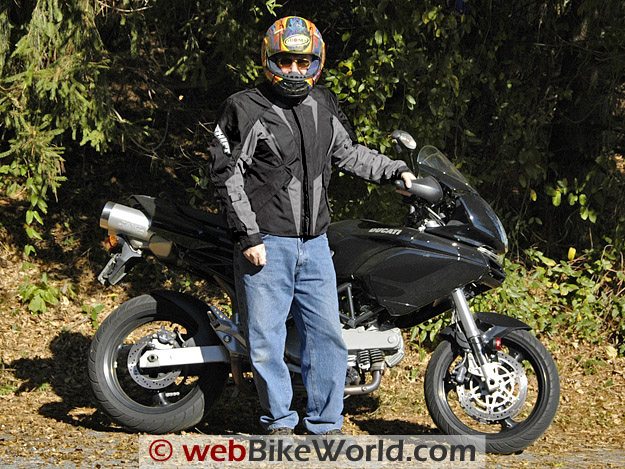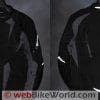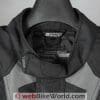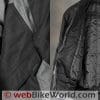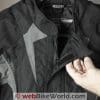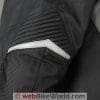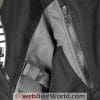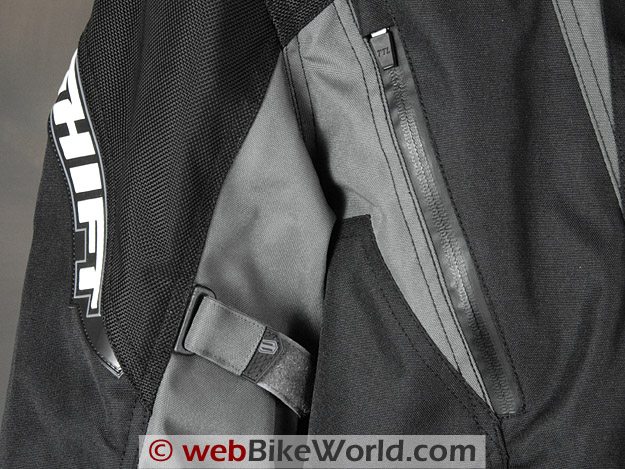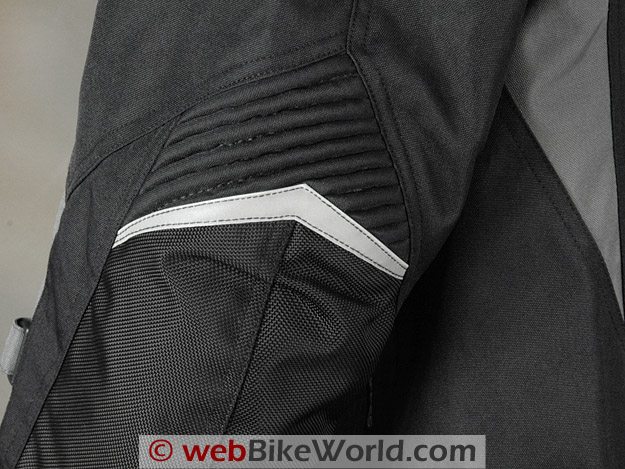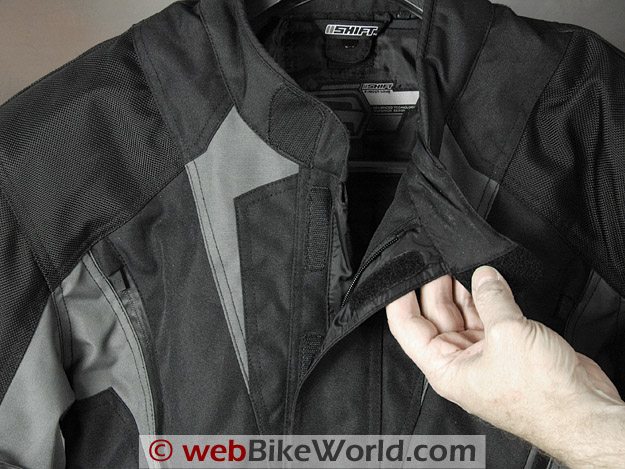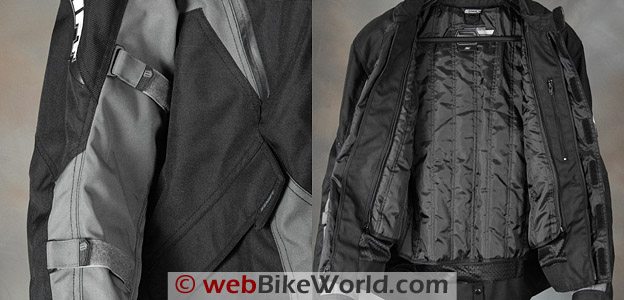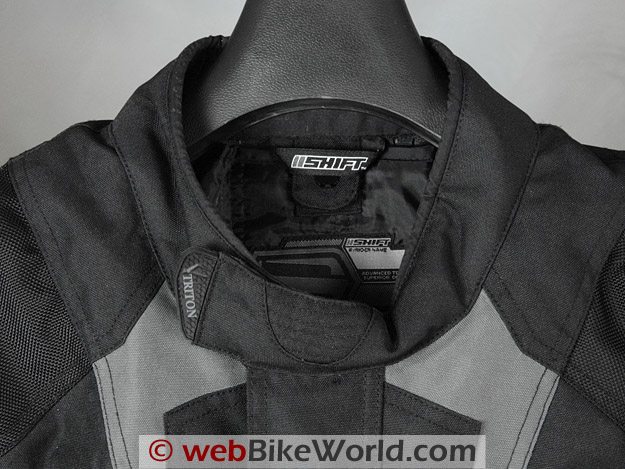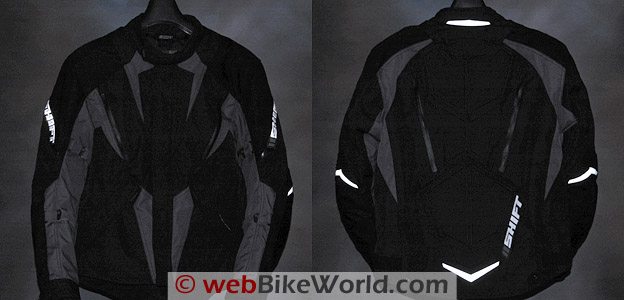Comfortable 3+ season jacket isn’t quite 100% waterproof in heavy rain, but it has a modest price, so the value equation is there, a hallmark of the Shift brand. This started out as a waterproof jacket series, but as Rick described in the Firstgear Teton jacket review, manufacturers may be a bit too liberal in their use of the word “waterproof”. “Water resistant” is more like it.
Standard testing procedures are available for measuring the water resistance of outerwear. The test methods describe a specific method and instruments to use to gauge the amount of moisture that passes through a fabric at specific pressures over measured times.
For example, in the U.S., the ASTM F2298-03 “Standard Test Methods for Water Vapor Diffusion Resistance and Air Flow Resistance of Clothing Materials Using the Dynamic Moisture Permeation Cell” is used and there are probably others developed by manufacturing associations.
The only company I’m aware of that actually tests their water-resistant clothing using these methods and reports the results to consumers is Rev’it, although there many be others.
Also, if a garment carries a Gore-Tex label, you can be certain it does what it says, because Gore is very, very specific about how their licenses are used, which helps maintain the brand identity and integrity. In fact, it’s rumored that at least one very famous and very high-end clothing manufacturer recently lost its Gore-Tex license, so it does happen.
In the meantime, it’s not that difficult to conduct the tests as outlined by the ASTM, EN or other standard test methods, or for motorcycle clothing manufacturers to develop their own procedures. This happens all the time in the world of standards, where a group of manufacturers agrees to develop either a common description, testing methods or standards.
First, they’d need a standardized testing procedure — the simpler the better, because potentially more manufacturers would be able to use it. Note that I am referring only to the testing methods themselves here; the manufacturing trade group could theoretically then develop a “consumer friendly” marketing communications method to describe the types of water resistance.
This might be something like a label that indicates which of five levels of water resistance a clothing article has been tested to, from high levels of water resistance down to no moisture barrier at all. Consumers could then decide what level they require and how much they’re willing to pay for it.
Right now, there’s basically nothing. A manufacturer says the item is “waterproof”, but without the “proof”, there’s usually the “water”!
Of course, making a “Level 5” water-resistant jacket is not as easy as one might think, because there’s always the issue of the openings in the garment for pockets, zippers and the like. And the material must be able to breathe.
But something has to give, because currently it is pretty much impossible to figure out what a manufacturer means when they call a motorcycle jacket or pants “waterproof”.
The Shift Triton SS Waterproof Jacket
Which brings us to the Shift Triton SS (“Storm Series”) Waterproof Jacket — the name used by Shift for this jacket. Just so you don’t get the wrong idea, I’ll start out by saying that I really like this jacket, and one of the reasons is because all of us here are partial to a garment like this that provides excellent value and performance for the money.
Shift Racing currently has two “SS” jackets in their lineup, the Streetfighter (previously reviewed on wBW) and the Triton.
If I remember correctly, at the time of the Streetfighter review in March of 2008, we weren’t having much rain, so it went into the shower for an evaluation of its water-repelling ability. This was suggested by a webBikeWorld reader as an alternative when the weather didn’t cooperate.
This time, the weather has been cooperating — to a fault. 2009 has been a very wet year and we’ve had a nearly steady rain this Fall for what seems like weeks at a time. So we’ve been swapping rides and jackets in real-world situations, which, of course, is a great way to compare but a lousy way to ride.
Jacket Shell
The outer shell of the Triton is made from a pretty typical 600 Denier nylon or poly type fabric and the weave is just slightly more rough than the Teton jacket but it also appears to have been treated somehow to have some water repellency at the surface, so a good deal of the water rolls off before it can soak the fabric.
The Triton jacket also has a water-resistant barrier bonded to the inside of the outer shell, much like theFirstgear Teton TPG jacket recently reviewed on webBikeWorld.
In some local riding in soft but steady rain that was just more than a drizzle but not quite a full downpour, the Triton held up fine and I stayed pretty dry.
Water-Resistant Zippers and Vents
The only issue I found with the water-resistance of the jacket has to do with the zippers. The jacket has two vertical vent zippers in the front and two in the rear. These are the water-barrier types with rubberized fabric forming an almost-complete seal over the zipper teeth.
The zippers have a “TTL” label embossed on them; I’m guessing the company is a competitor of YKK. The zipper pulls are covered by little fabric “garages” when the zippers are fully closed, to help keep out moisture.
The water-resistant seal over the zipper teeth doesn’t quite fit as tightly as I’ve seen on other zippers of this type, and since the vents behind the zipper open directly into the shell, through the bonded water-resistant barrier, there was some leakage in the front. Not a lot, and I was able to mitigate this by wearing a water-resistant pullover underneath, but this is an example of the issue of calling a jacket “waterproof”.
However, there’s always that tradeoff: water resistance vs. ventilation. The positive aspect of having the vents open through the shell to the inside of the jacket is the air flow this provides in warmer (and drier) weather. The vents on the Triton are located to provide good air flow for a jacket of this type, proven on the few days where the rain stopped and it actually got warm enough to use them.
Probably adding some type of folding barrier behind the vents to prevent water leakage when the vents are closed would be a good idea…but this would probably also have raised the price of the Triton; another compromise.
The front zipper is of a slightly smaller gauge than some other motorcycle jacket zippers I’ve used, but it works fine and has an added pull tab. The zipper is then covered by a doubled-over section of water-resistant material on the left placket, and then the entire assembly is completely covered by the front jacket flap, which attaches with hook-and-loop fabric on the left side. This all works as an effective seal in the front to block water and wind.
The sleeve cuffs are pretty basic, closing with hook-and-loop on the outside of the cuff. The sleeve ends have a dart inside to allow the cuff to expand. It’s about as simple as you can get, but it works and the cuffs can be cinched down tight enough to easily fit inside glove gauntlets.
The Shift Triton SS jacket doesn’t have other pretensions, it’s just a nice, straightforward, what-you-see-is-what-you-get, all-around riding jacket at a reasonable cost. Something about the Triton makes it feel comfy and broken-in right from the start — probably because of the absence of pretentions and the fact that it meets reasonable expectations.
Also, not everyone wants to or can afford to spend $500.00 on a motorcycle jacket, so having roughly 80% of the performance for about 25% of the price is a good deal in anyone’s book.
Shift Triton Jacket Sizing
The Triton is only available in the black and gray color pattern shown here. The Triton is slightly longer than a short jacket, but not quite as long as a 5/8- or 3/4-length style, making the length a good compromise for all-around street riding and touring.
We have both a size L and XL and both of them fit according to the Shift Racing size charts, which say that the L should fit a 40.5 to 43.0 inch chest and the XL fits a 43.0 to 45.5 chest. Those with a 44″ chest will have to choose whether to wear the jacket with a snug fit in size L, which loosens up about 1/2 size when the insulating liner is removed, or the looser fit of the size XL.
Pockets
Each front slash pocket also features a TTL water-resistant zipper, located underneath a folding flap that closes with hook-and-loop fastener and which has a nice tab to use for opening. The pockets feel like they are lined with water-resistant material and they do keep my items dry.
Another zipper pocket is located just inside the left placket and it also feels like it is lined with water-resistant material. I use this to hold a wallet.
The low price of the Triton jacket means another couple of compromises; there are no pockets in the insulating liner or the inside of the shell itself, but since the other three pockets are generously sized, this hasn’t been a problem for me.
Insulating Liner
The insulating liner is removable and washable (according to Shift). It’s pretty much the typical quilted insulating liner material, inside a shiny taffeta exterior. But it works rather well, I think due to a combination of the water- and wind-resistant barrier bonded to the inside of the shell. This combination works very nicely to block the wind and I am warmer wearing the Triton jacket than I thought might be the case.
The liner is attached with zippers on either side in the front, and it’s also attached with three snaps at the neck, located on fabric tabs, and two snaps each down at the cuffs. The combination of the zippers, the strong neck snaps and the sleeve snaps all work to keep the liner in place when the jacket is being put on or taken off.
Padding and Armor
The Triton also has a removable back pad and it’s possible that it could be replaced with a more serious protective piece. The back of the jacket has some angular sections of padding sewn in as styling features, so perhaps these add a little extra protection also.
Speaking of protection, the Triton has CE-approved armor in the shoulders and arms, and these feel larger and thicker than normal, so hopefully they will do the job if required. The armor feels like it will remain in place because of the proper snug fit when I wear the size large, due to the cut of the jacket.
The sleeves have two cinch strap adjusters, one at the bicep and one at the forearm, which can be tightened to keep the sleeves from flapping in the wind and also to keep the elbow armor in place. The cinch straps are both easy to use and have rubberized grab tabs, but the hook-and-loop is exposed on the outside, so it does catch some dirt and detritus, but can be cleaned with a comb or brush.
Wearing the Shift Triton Jacket
Something about the way the Triton is cut makes the jacket feel very comfortable. The availability of both the L and XL sizes proved to be interesting, because the larger size with more room makes a very comfortable touring jacket, although there’s no reason why touring riders need less protection than anyone else.
But for tooling around while sitting on the big BMW K1100LT, the extra room in the size XL just feels right.
The Triton has some angular styling, and the cut of the fabric sections seem to form a “V” shape, which also helps the fit and helps to hide the armor. The jacket also has a small “tail” at the bottom, to help cover the rear. The Triton has “accordion panels” built in to the sleeves of the jacket, which probably also help add flexibility.
In addition to the arm cinch straps described in the “Padding and Armor” section above, the Triton has adjustable waist belts on either side at the hem. They are well-hidden or camouflaged in the black hem material.
Reflectivity
The Triton has a few sections of reflective material as illustrated in this photo:
The Rest of the Story
Attachment Zipper: The jacket also has an internal 8″ zipper on a piece of stretch fabric, which allows it to be attached to other Shift Racing brand pants.
Stitching: Most of the seams on the Triton are double-stitched. The material used for the stitching is unknown and it is mostly external. The stitches are mostly straight and nicely made and a minor detail that would probably go unnoticed is the extra two stitch reinforcements where the sleeve cuff adjustment tab meets the sleeve arm. These are sometimes used to reinforce the stitching and make a stronger bond at stress points.
| The Opinionator – Shift Triton SS Jacket | |
| Picks… | …and Pans. |
|
|
Second Opinion
I borrowed the size XL Triton to wear during a recent helmet evaluation. The temperature was a steady 40 degree F (4 C) with strong northerly winds of 25 mph.
The jacket fits slightly loose over my 43″ chest, but the Firstgear Basegear wind-blocking underwear and theTourmaster Synergy vest bulked it up and it then fit without being too tight. I also wore an old pair of Rev’it insulated pants, an older pair of Dainese un-insulated boots and the Roadgear winter gloves.
I pushed “Low” on the Synergy vest controller and rode for about 2 hours and stayed nice and warm, except for my fingers and toes. I’m surprised at how well the Triton blocks the cold air, even on my shoulders and arms, which usually get cold. It has a roomy cut and with only the Basegear and the Synergy vest, I was perfectly comfortable.
Conclusion
The Shift Racing Triton SS Waterproof Jacket offers a lot of value for the money, as do all of the Shift Racing gear that we’ve worn. It’s mostly water-resistant, with the front zippers on this one leaking slightly during a steady rain. But expectations for the Triton, considering the price, were definitely met and exceeded. The jacket also is surprisingly warm and wind-resistant.
Long-distance touring riders who plan on riding through heavy rain will probably be looking elsewhere anyway, but anyone looking for a good 3+ season all-around riding jacket that can keep you dry in the occasional wet days that will surely be experienced when commuting or during general riding, it’s hard to beat the Shift Triton jacket.
|
wBW Product Review: Shift Racing Triton SS Waterproof Jacket |
|
| Available From: Shift Racing | List Price: $179.95 |
| Colors: Black with gray. Sizes: S to XXL. |
Made In: China |
| Review Date: November 2009 | |
Owner Comments and Feedback
See details on submitting comments.
From “H.H.” (12/09): “I recently picked up a SHIFT Triton jacket. I found one on sale for a great price ($125.00). I ride a BMW HP2 Megamoto, which has an “upright” riding position, so I am usually getting a pretty good blast of whatever the docile Southern California weather has to dish out!
The jacket compliments my previously purchased BMW “City Pants” which are a dark grey and honestly speaking, it had a factor in my purchase.
I am VERY pleased with the sizing and fit. I have a 45 inch chest and wear an “XL”. As it is winter, the jacket has the quilted liner that has yet to be removed, but it is very comfortable and warm. My riding is fair weather only, but it gets in the 50’s and low 60’s where I’m riding and I have never felt cold.
The only issue has been the fit around the neck area as the material feels somewhat abrasive. This issue may resolve itself once the jacket is worn in.
All in all, I would rate it with 4 out of 5 stars. My previous motorcycle was a BMW 1200GS and I usually rode with a BMW Rally Pro 2 jacket, the Triton is more “form fitting” and I prefer it to the $700.00 plus jacket for fast backroad jaunts.”


